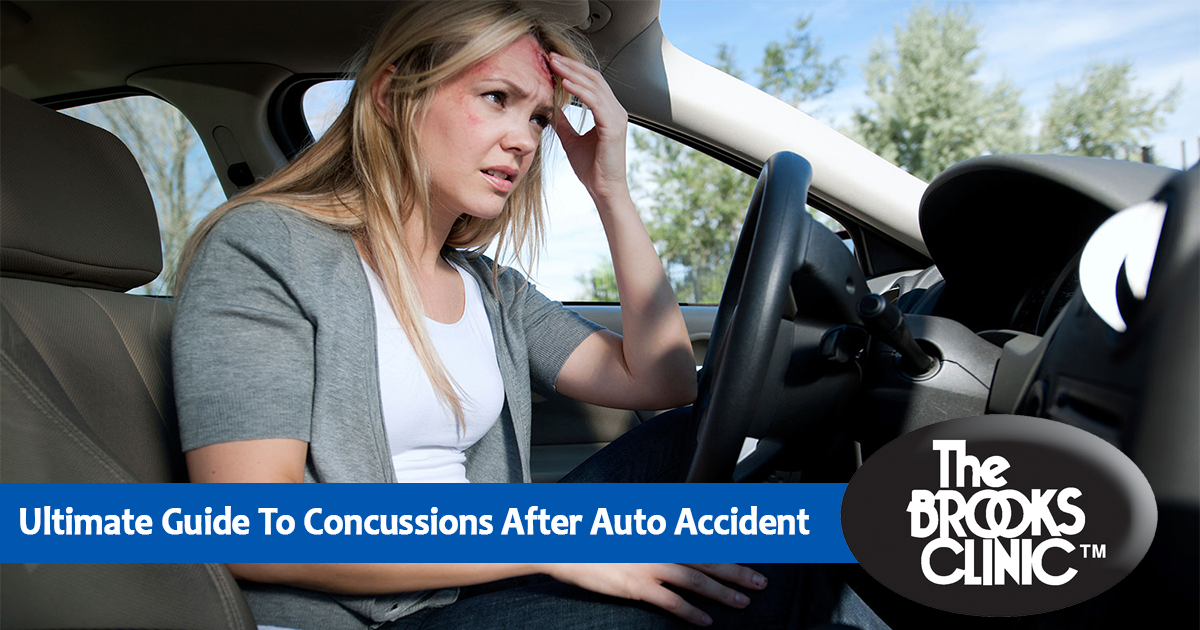 You may not feel any whiplash pain immediately after an accident, and then feel horrible after a couple of days. One of the most common questions is, “why does whiplash last so long?
You may not feel any whiplash pain immediately after an accident, and then feel horrible after a couple of days. One of the most common questions is, “why does whiplash last so long?
Right after an accident, your body is flooded with adrenaline. That rush can make you feel better than usual because you’re body is compensating for any injury it might have. That’s why it is so important to be checked by a doctor. Your Brooks Clinic doctor may find simple injuries, including whiplash, even before you feel pain. That’s important, because the sooner you start treatment, the sooner the injured tissue will begin to heal.
Whiplash injuries can’t always be felt immediately following a car accident. It is common for symptoms to develop between 6 and 12 hours after the crash, while some can appear days after, and get progressively worse. Whiplash symptoms can last from a few days to many months or even longer, depending on the severity of the injury to the soft tissue in your neck and upper back. Some significant injuries may feel persistent neck pain for a year after their accident. Medical intervention and generally shorten the healing period.
How Does Whiplash Occur?
Whiplash happens when the head is jolted in a forward motion, and then snaps back. This type of injury is most common in road traffic accidents and can happen irrespective of the speed of the impact. When your car is hit from behind, there is generally a significant motion that leads to whiplash.
Similar to cracking a whip, the sudden jolting of the neck causes damage to the tendons and ligaments that support the head and neck. It can be very painful, producing headaches, shoulder pain and much more. The force of the impact is most often felt in the head and neck because your body is held still and restricted by the seatbelt. Injuries can be even more sever if your neck is turned sideways during the accident. It can also be worse if you were in an ultra relaxed state – not expecting the accident.
Medical studies indicate that whiplash injuries can occur with speeds as low as 5 miles per hour (Howard, 1998). Insurance companies often challenge whiplash at low-speeds, which is again, another reason to be checked by a medical doctor with experience diagnosing whiplash.
But Why Does Whiplash Last So Long?
This is usually all to do with the individual circumstances of the direction of impact and position in the vehicle. Additionally, the size of the passenger or driver makes a difference in the resulting injury. A small female will experience two to four times the head linear acceleration as a larger male in the same crash. The male, however, will experience greater rearward bending.” (Croft, 2008). No matter your size, the head and neck just aren’t equipped to handle an impact from a vehicle weighting thousands of pounds.
Car accidents aren’t the only cause of whiplash, any sudden movement of the head and neck can cause whiplash injuries, but it is one of the most common injuries as a result of road traffic accidents.
Seek Medical Attention
Let’s talk about why it’s important to get a thorough medical exam after a car accident even if you don’t immediately feel hurt. There are really two reasons to do this: 1) early diagnosis will often prevent a greater injury for occurring, and 2) you will want to preserve your rights to healthcare if you experience pain down the road.
Get Treatment Until Your Doctor Releases You
Once you are diagnosed with whiplash, you doctor will put you on a course of treatment. The strategy for your healing protocol is to heal the inflammation so that the muscles and ligaments heal faster. Whiplash treatment usually involves some manipulation, so you may feel worse before you feel better. Most of the time, that is because the doctor will work the muscles surrounding the injured area. The idea is to build up the area to take the stress off the injury. Always remember to follow the course of treatment until your doctor tells you to stop. Following the treatment protocol is well established and will provide long range improvement.
Talk With Your Doctor
Always make sure that your doctor understands how you are feeling. It’s not uncommon for people to get in front of their doctor and just “freeze”. He asks how you are feeling, and you answer with “OK”, when in reality you don’t feel like your situation is improving. It’s fine to remind him that you are not sleeping well, have trouble sitting for long periods, or even have an uncommon and unrelenting headache. Those are all triggers that will cause him to rethink his treatment and add additional care.
Also make sure that your medical records accurately state your symptoms. If you are unsure that the notes reflect the amount of pain you are in – ask to go over the notes with your doctor. The primary goal is to get you well. The secondary goal, but just as important, is to make sure that your chart is properly documented in case you need additional care. If you make an injury claim, the defense always looks at your medical history to find something (such as a pre-existing condition) that they can point to as the “real” cause of your current symptoms. So, make sure that your medical history is accurate, especially when it comes to pre-existing conditions.




